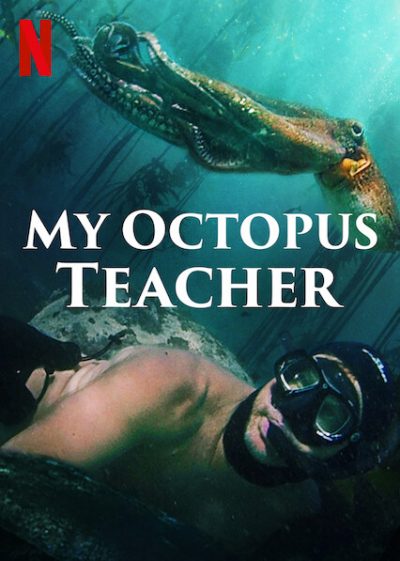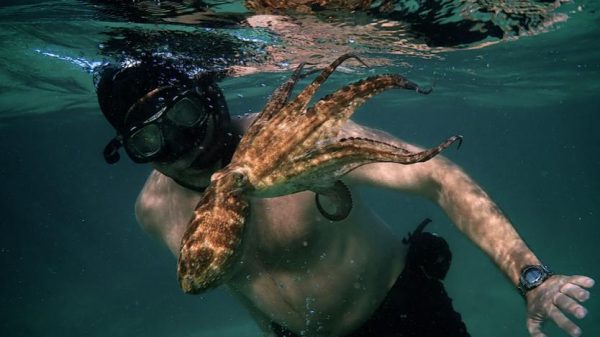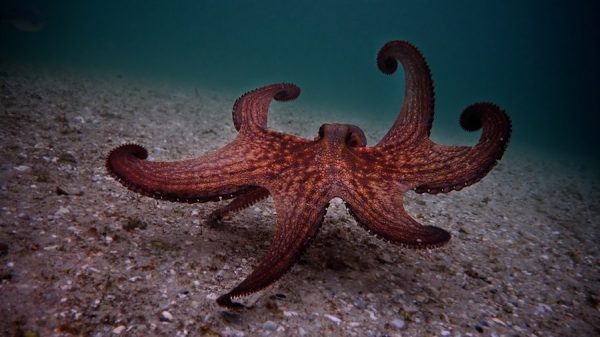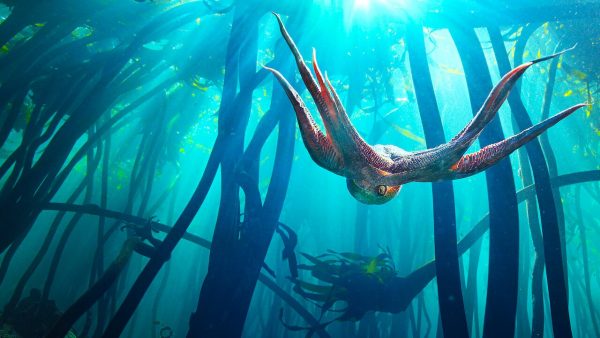“My Octopus Teacher” (2020). Cast: Craig Foster, Tom Foster. Director: Pippa Ehrlich and James Reed. Screenplay: Pippa Ehrlich and James Reed. Web site. Trailer.

Discovering ourselves is often a challenging process, especially when we feel lost and have no idea where or how to look for answers. However, if we remain open to options – including those that appear to be coming to us from unlikely sources – we may just find the guidance we seek. So it was for a lost soul searching for himself as depicted in the beautiful and moving new documentary, “My Octopus Teacher.”
At the opening of this highly personal documentary, South African director and cinematographer Craig Foster confesses to feeling lost and severely burned out. While he doesn’t elaborate on the details, he admits to a lack of motivation for taking on new projects. He also laments that, as the father of a young son, Tom, who was beginning his approach to adolescence, he didn’t feel up to the task of providing the paternal guidance that someone at such an impressionable age generally requires. As a result, Craig says he was spending most of his time adrift, looking for the spark to get himself and his life back on track.
Having grown up on the South African seacoast, Craig says he was always strongly influenced by his proximity to the ocean. And, given his love of nature, the subject of many of his previous film projects, he felt a tie to the environment and all its wonders. So, after an extended period of time contemplating how to proceed, he began to sense that a return to the natural world would be just what he needed to revive himself. Little did he know at that point how right he would be.
Craig decided to go snorkeling in the thick kelp forest in the cold ocean waters just off the shore of where he lived. He was in awe of the rich and diverse animal and plant life he encountered. But what captivated him most was an encounter with a small octopus, one that was cautiously defensive at first. However, the longer he interacted with the little mollusk, the more he could see that the octopus was as curious about him as he was about the octopus. Thus began an unusual but heartfelt “relationship” between Craig and his new underwater friend.
As a result of this encounter, Craig says he wanted to know more, so he decided that he would go snorkeling every day to seek out this fascinating creature. And, the more time he spent in the company of the octopus, the more intimate their relationship became, one that would become characterized by qualities that he never expected would arise between a human and an undersea animal.

While some may contend that this is nothing more than a case of anthropomorphism, skeptics would have a hard time convincing Craig otherwise. As the film illustrates, the octopus demonstrates traits like curiosity and trust in ways that are far too humanlike to be dismissed as purely coincidental but unintended animal behavior. That’s particularly true in light of their repeat occurrence; if it happened only once, it might be easy to chalk up the experience to the contentions put forth by the skeptics, but, since such attributes became apparent over and over again, it’s hard to argue with Craig’s observations.
The more time Craig spent with the octopus, the more he could see just how startlingly intelligent it was. For example, when it came to matters of protecting itself, the octopus proved to be a master of camouflage and escape tactics, especially in safeguarding itself against the waters’ native predatory pajama sharks. The same was true of the creature’s hunting technique, coming up with clever means of stalking its prey. From these observations, Craig concluded that the intelligence and inventiveness of the octopus has been grossly underestimated. Indeed, it could be one of the most sentient beings on the planet, though we’ve never noticed that before due to a lack of such up-close interaction.
On top of that, though, Craig observed that there was more to this creature than just its surprising intelligence. He came to find that there was much that we could learn from the octopus, lessons in intangible qualities that many of us would be reluctant to admit could be attributed to an undersea animal. He found that especially helpful to him given what he was going through personally at the time, attributes that he discovered he could make use of in his own life in areas like compassion, acceptance, love and connection. In particular, he drew upon this experience in fostering a stronger relationship with Tom, whom he eventually invited to join him in his daily snorkeling adventures. Through this ongoing odyssey, Craig came to discover that this fascinating little creature would indeed become his octopus teacher.

Fortunately for Craig, he got exactly the teacher he needed at exactly the time he needed it. But that’s no surprise considering this manifestation arose as a result of the conscious creation process, the philosophy that maintains we materialize the reality we experience through the power of our thoughts, beliefs and intents. This doctrine maintains that our outer world mirrors our inner selves, bringing into being what we focus upon. Whether or not the film’s protagonist is aware of this philosophy, it’s apparent he’s developed a certain mastery over its principles, enough so that he freely admits to recognizing that the appearance of the octopus and its behavior at that time were reflections of his inner being. And, given his unspoken but nevertheless definitive need for a teacher to help him turn his life around, the octopus – as unlikely as it may seem – fulfilled this requirement.
In observing the animal’s behavior, Craig notes its adaptability to its environment and the circumstances affecting it. He says he learned much from this experience from a pragmatic standpoint, particularly in matters of improvisation and devising solutions to overcome limitations, hallmarks of conscious creation proficiency. But, over time, as he began to more fully understand the nuances of the creature’s actions, he noted the surfacing of more intangible qualities, traits that he previously never would have believed an octopus could possess or exhibit. These were the same qualities that were beginning to surface in Craig himself, reinforcing his observation about his undersea friend serving as a reflection of his own inner being.
To his credit, Craig recognized the parallels and saw how he could apply these notions in his own life. The experience thus became an opportunity to learn important life lessons, particularly in matters of allowing his true self to emerge. This enabled him to take ownership of his personal integrity and make it manifest in his everyday existence, not only in his dealings with the octopus, but also in his experiences on dry land. There’s much to be said for this, even if it came about in a most unexpected way.

As noted above, Craig says that he learned much about such concepts as connection, love and compassion. And those principles, in turn, translated into significant developments in his daily life, altering his future in important ways that he never saw coming. Perhaps the most significant of these was his establishment of the Sea Change Project, an initiative aimed at promoting greater awareness of oceanic-related considerations, particularly the beauty, sustainability and ecological importance of South Africa’s kelp forest and the creatures that inhabit it. The passion that came out of Craig’s personal undersea odyssey has thus yielded an organization with an earnest mission whose implications are far greater than anything he might have imagined when he began his snorkeling adventure. Who would have believed when this all started that something so seemingly small could lead to something so notably grand in scale?
Through these developments, Craig and the octopus have thus taught many of us how to relate to our world in new, innovative and unexpected ways. That likely was not the seeming intent when this all began, but that is what has grown from it. While Craig was seeking to find himself, he did, but in ways that he probably did not consider as part of his original plan. Nevertheless, when he launched into his effort to find himself, he laid the fundamental foundation for what would emerge, even if he wasn’t aware of the form it would eventually take at that time. The seeds of what ultimately would surface were planted at that point, blossoming into the impressive creation that would one day be born, a product of both his own inventiveness and his personal evolution. This progression of events thus elegantly illustrates the conscious creation notion that we’re all in a constant state of becoming.

In line with the foregoing, Craig thus came to discover his destiny, which, in conscious creation terms, is referred to as his value fulfillment, the principle that maintains we seek to be our best, truest selves for the betterment of ourselves and those around us. Considering what has emerged from this experience, the outward, tangible manifestation of this concept should be obvious, with wide-ranging implications affecting both humanity and our kindreds in the plant and animal kingdoms. But, on a more personal level, it has also enabled Craig to live out his value fulfillment for himself, to become his own best, truest self for his own personal betterment. We should all hope that we can bring ourselves to attain that, considering who and how many of us stand to benefit from it.
Who would have thought that we could learn anything meaningful from an undersea mollusk? Yet, if we’re willing to devote the time and effort to studying the miracles of nature, there’s no telling what we might glean from the experience, both about our subject and ourselves. Such is the remarkable experience of Craig Foster, whose story is beautifully and meaningfully told through this superb documentary. Gorgeously filmed and warmly narrated, this moving offering from directors Pippa Ehrlich and James Reed shows us a world seldom seen, with insights never imagined about a creature we know of but know virtually nothing about. It also profoundly touches us in heartfelt ways, drawing out an array of emotions that might include the shedding of a tear or two. This BAFTA Award-winning release and Oscar nominee is truly a cinematic labor of love, one richly deserving of all the recognition and accolades it has received. The film is available for streaming online.
If one ever had any doubt about the undeniable connections between us and everything in our existence, “My Octopus Teacher” certainly dispels that uncertainty. As this film so beautifully illustrates, it’s quite remarkable how such an outcome can result. We should be grateful for the opportunity to have experiences like this. But, considering how and where they arise from in the first place, we should thank ourselves for having the wherewithal to create them. When we understand that – and when we understand ourselves – we have an opportunity to appreciate who we are and what we’re capable of. And what a miracle that is.
Copyright © 2021, by Brent Marchant. All rights reserved.

No comments:
Post a Comment